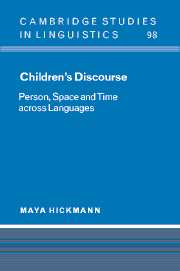Book contents
- Frontmatter
- Contents
- List of figures
- List of tables
- Preface
- List of abbreviations and conventions
- 1 Introduction
- Part I AVAILABLE THEORIES AND DATA
- 2 Theoretical issues
- 3 Cross-linguistic invariants and variations
- 4 Coherence and cohesion in discourse development
- 5 Children's marking of information status: referring expressions and clause structure
- 6 The acquisition of spatial and temporal-aspectual devices
- Part II A CROSS-LINGUISTIC STUDY OF CHILDREN'S NARRATIVES
- Appendix
- Notes
- References
- Author index
- Subject index
2 - Theoretical issues
from Part I - AVAILABLE THEORIES AND DATA
Published online by Cambridge University Press: 22 September 2009
- Frontmatter
- Contents
- List of figures
- List of tables
- Preface
- List of abbreviations and conventions
- 1 Introduction
- Part I AVAILABLE THEORIES AND DATA
- 2 Theoretical issues
- 3 Cross-linguistic invariants and variations
- 4 Coherence and cohesion in discourse development
- 5 Children's marking of information status: referring expressions and clause structure
- 6 The acquisition of spatial and temporal-aspectual devices
- Part II A CROSS-LINGUISTIC STUDY OF CHILDREN'S NARRATIVES
- Appendix
- Notes
- References
- Author index
- Subject index
Summary
The present chapter provides theoretical background by spelling out some of the major current debates that oppose different approaches in developmental psycholinguistics. I first summarise a number of main controversial issues that are currently debated in the study of language acquisition (Section 2.1). I then focus on some fundamental properties of language within functional approaches to language (Section 2.2), including multifunctionality and context-dependence, as well as the existence of two levels of linguistic organisation, the sentence and discourse. Finally, I examine general universal principles of discourse organisation that underlie how speakers regulate the flow of personal, spatial, and temporal information across utterances in cohesive discourse (Section 2.3). Subsequent chapters show how these principles constitute fundamental aspects of our linguistic competence that must be mastered by children and that affect their acquisition of linguistic devices across domains.
Some main theoretical issues in theories of language acquisition
I briefly summarise here five major recurrent issues that have been controversial among different approaches to language acquisition: claims about the innateness of language vs. its gradual construction by the child (Section 2.1.1); the relative importance attributed to form and structure vs. function and context-dependence as criterial properties of language (Section 2.1.2); the related focus on competence vs. performance (Section 2.1.3); the relative continuity vs. discontinuity in the course of acquisition (2.1.4); different views of the relation between language and cognition during development, varying in terms of whether and how language may have a structuring role on thought (Section 2.1.5).
- Type
- Chapter
- Information
- Children's DiscoursePerson, Space and Time across Languages, pp. 21 - 48Publisher: Cambridge University PressPrint publication year: 2002



